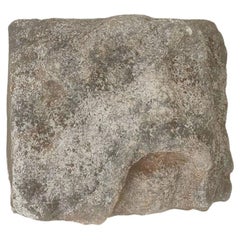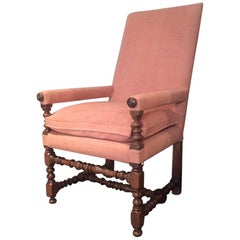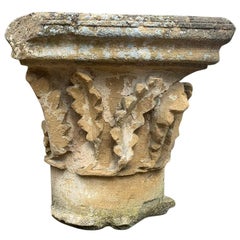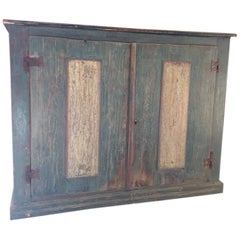Want more images or videos?
Request additional images or videos from the seller
1 of 11
17th Century Gargoyles
$4,335.07List Price
About the Item
- Dimensions:Height: 19.3 in (49 cm)Width: 10.24 in (26 cm)Depth: 11.82 in (30 cm)
- Style:Baroque (Of the Period)
- Materials and Techniques:
- Place of Origin:
- Period:
- Date of Manufacture:17th Century
- Condition:Wear consistent with age and use.
- Seller Location:Vosselaar, BE
- Reference Number:Seller: 678.12.071stDibs: LU202334888033
About the Seller
5.0
Vetted Professional Seller
Every seller passes strict standards for authenticity and reliability
Established in 1972
1stDibs seller since 2016
279 sales on 1stDibs
Typical response time: 7 hours
Authenticity Guarantee
In the unlikely event there’s an issue with an item’s authenticity, contact us within 1 year for a full refund. DetailsMoney-Back Guarantee
If your item is not as described, is damaged in transit, or does not arrive, contact us within 7 days for a full refund. Details24-Hour Cancellation
You have a 24-hour grace period in which to reconsider your purchase, with no questions asked.Vetted Professional Sellers
Our world-class sellers must adhere to strict standards for service and quality, maintaining the integrity of our listings.Price-Match Guarantee
If you find that a seller listed the same item for a lower price elsewhere, we’ll match it.Trusted Global Delivery
Our best-in-class carrier network provides specialized shipping options worldwide, including custom delivery.You May Also Like
17th Century, Carrera Marble Lion Fountain Head
Located in Los Angeles, CA
Stunning, solid white, Carrara marble lions head from a fountain in Florence featuring a flowing main and a fabulous patina. Mounted on a custom, iron base. The piece hails from the ...
Category
Antique Early 1600s Italian Sculptures
Materials
Marble
19th Century Large Circular Garden Fountain Neptune, Italian Limestone Fountain
Located in West Palm Beach, FL
A monumental 19th Century three - tier garden fountain from Italy in hand carved limestone with a weathered patina. Four hand sculpted Caryatids surround the center base raising the ...
Category
Antique Early 19th Century Italian Baroque Fountains
Materials
Limestone
Price Upon Request
H 274.8 in W 187.5 in D 187.5 in
Italian 19th Century Carved Carrara Marble Figural Fountain Jardinière Planter
By Giovanni Battista Lombardi
Located in Los Angeles, CA
A very fine Italian 19th century carved Carrara marble figural fountain "Jardinière" modelled as a standing Putto and a Satyr supporting a sea-sh...
Category
Antique 19th Century Italian Baroque Figurative Sculptures
Materials
Carrara Marble
$28,950 Sale Price
35% Off
H 50.5 in W 31 in D 26 in
20th Century Italian Stone Fountain Mask
Located in Milano, MI
This antique stone mask was probably used in a fountain. It is a very decorative Italian antique object. The mask fits as decorative object on a bureau o...
Category
Early 20th Century European Classical Roman Animal Sculptures
Materials
Stone
Whimsical English 19th-20th Century White Marble Figural Outdoor Dog Fountain
Located in Los Angeles, CA
A Whimsical English 19th-20th century white marble figural fountain with dogs fountain. The Baroque Revival six-sided tripod marble base surmounted with three upright seated Yorkshire Terriers resting on a leaf and acanthus center stem, topped with a semi-circular scalloped carved basin...
Category
Antique Early 1900s English Baroque Revival Fountains
Materials
Marble
$14,850
H 60.63 in W 30.5 in D 28.5 in
Italian 19th-20th Century Whimsical White Marble Wishing Wellhead with Children
Located in Los Angeles, CA
A very fine and exceptionally carved Italian 19th-20th century Baroque Revival style whimsical white Carrara marble wishing wellhead, raised on an octagonal two-step marble base. The intricately carved marble relief circular wellhead depicting carved figures of dancing and cheerful children (Putti) among vines, flowers and fruits, dancing and playing musical instruments with a backdrop of castles, landscapes, forests and wreaths, Florence, circa, 1900.
Note: We have part II video of this amazing Wishing Wellhead. Please feel free to request a copy.
Literature:
A similar wellhead was sold by Jan's & Co. Fine French Antiques, Inc. in 1999, provenance the Atkinson/Kirkeby Estate and it is illustrated in "The Estates of Beverly Hills" by Charles Lockwood and Jeff-Hyland, page 150.
Another similar is currently on display at the gardens of "The Elms" mansion a public museum part of the Newport Mansions by The Preservation Society of Newport County in Newport, Rhode Island.
Yet another similar wellhead carved with frolicking putti with musical instruments and a dentil molded rim is located at Cranbrook House, Bloomfield Hills, Michigan, and is illustrated in B. Israel, Antique Garden Ornament...
Category
Antique Early 1900s Italian Baroque Revival Figurative Sculptures
Materials
Carrara Marble
$194,500
H 32 in Dm 51 in
A French 19th-20th Century Carved White Marble Fountain Sculpture with Children
Located in Los Angeles, CA
A fine and charming French 19th-20th century carved white marble whimsical group sculpture depicting two putti (Children) playing with a dolphin, fitted for use as a fountain, Paris,...
Category
Antique Early 1900s French Louis XV Fountains
Materials
Marble
$9,985 Sale Price
20% Off
H 36.25 in W 21.25 in D 18 in
Archangel Sculptures, 17th Century
Located in North Miami, FL
A pair of late 17th Century Italian Baroque carved wood, gold gilded and polychromed Archangel sculptures mounted on Lucite bases.
Category
Antique 17th Century Italian Baroque Figurative Sculptures
Materials
Gold Leaf
Early 17th Century Sculpture
Located in Copenhagen, K
Amazing Baroque sculpture of a woman wearing a crown in original paint. Her hands are missing. Colors are untouched, recently cleaned off from a thick dark coating, I have images fro...
Category
Antique Early 17th Century French Baroque Figurative Sculptures
Materials
Oak
Italian Ancient Marble Sculpture Fountain, Late 16th Century
Located in Milano, IT
Sea monster
Carrara marble mouth fountain
Italy, late 16th century
It measures 13.8 x 31.5 x 18.9 in (35 x 80 x 48 cm)
State of conservation: some small evident gaps and widespread signs of wear due to outdoor exposure. The gray marks crossing it do not come from restoration, but are rather the natural veins of the marble.
This work has some morphological characteristics typically associated with the iconography of the sea monster: an elongated muzzle, sharp teeth, protruding eyes, elongated ears, and a coiled serpent's tail.
An in-depth series of studies on artistic depictions of the sea monster attempted to verify how this symbol evolved in antiquity in the European and Mediterranean contexts and how it gradually changed its image and function over time. The iconography itself is mutable and imaginative and its history is rich with cultural and artistic exchange, as well as the overlapping of ideas. This occurred so much that it is difficult to accurately pinpoint the "types" that satisfactorily represent its various developments.
However, we can try to summarize the main figures, starting from the biblical Leviathan and the marine creature that swallowed Jonah (in the Christian version, this figure was to become a whale or a "big fish", the “ketos mega”, translation of the Hebrew “dag gadol”). Other specimens ranged from the dragons mentioned in the Iliad (which were winged and had legs) to "ketos” (also from Greek mythology), the terrifying being from whose Latinized name (“cetus”) derives the word "cetacean". See J. Boardman, “Very Like a Whale” - Classical Sea Monsters, in Monsters and Demons in the Ancient and Medieval Worlds, in Papers presented in Honor of Edith Porada, Mainz am Rhein 1987, pp. 73-84).
In Italy the monster underwent yet further variations: it can be found in Etruscan art on the front of some sarcophagi representing the companion of souls, while among the Romans we find the “Pistrice” (cited by Plinio in Naturalis Historia PLIN., Nat., II 9, 8 and by Virgilio in Eneide: VERG., Aen., III, 427), which appeared in the shape of a stylized hippocampus or a very large monstrous cetacean and evolved into a hideous being with a dragon's head and long webbed fins.
During the Middle Ages, the sea monster was the object of new transformations: at this time, it is often winged, the head is stretched like a crocodile, the front legs are often very sharp fins - sometimes real paws - until the image merges with dragons, the typical figures of medieval visionary spirituality widely found throughout Europe (on this topic and much more, see: Baltrušaitis, J., Il Medioevo fantastico. Antichità ed esotismi nell’arte gotica, Gli Adelphi 1997).
In Italy during the 15th and 16th centuries, the revival of classicism - representative of the humanistic and Renaissance periods - led to a different reading of these "creatures". Indeed, the sea monster was also to find widespread use as an isolated decorative motif, especially in numerous fountains and sculptures where dolphins or sea monsters were used as a characterizing element linked to water (on this theme see: Chet Van Duzer, Sea Monsters on Medieval and Renaissance Maps, London, The British library, 2013).
From the morphological point of view, the "sea monsters" of this period are mostly depicted as hybrid figures, in which the body of a mythological or real being (a hippocampus, a sea snake, a dolphin), is joined to a head with a rather indistinct appearance. It was usually characterized by large upright ears, an elongated snout, sharp teeth and globular, protruding eyes; a complex and indefinite figure, both from the symbolic point of view and from that of its genesis.
The work we are examining is placed as a cross between the medieval sea serpent and the Renaissance dolphin, with stylistic features which recall the snake as often used in heraldry (such as the "snake" depicted in the coat of arms of the Visconti - the lords and then dukes of Milan between 1277 and 1447 - and which, for some, may be derived from the representations of the “Pistrice” that swallowed Jonah).
In the search for sources, Renaissance cartography and in particular woodcuts should not be neglected. See for example the monsters of Olaus Magnus, from the editions of the “Historia de gentibus septentrionalibus” (“History of the peoples of the north”) and the natural histories of Conrad Gesner, Ulisse...
Category
Antique 16th Century Italian Renaissance Animal Sculptures
Materials
Carrara Marble
More From This Seller
View All17th Century Sandstone Gargoyle on Stand
Located in Vosselaar, BE
A early 17th century French Gargoyle. Gargoyels were originally intented as waterspouts for churches and castles but soon were used as ornamentation. A...
Category
Antique 17th Century French Baroque Figurative Sculptures
Materials
Sandstone
17th Century Armchair
Located in Vosselaar, BE
Fine French Louis XIII armchair. Made in the 17th century from walnut and equipped with hidden out sliding tray supports as a extra feature. We restored this armchair and reupholster...
Category
Antique 17th Century French Baroque Armchairs
Materials
Walnut
$3,612
17th Century Stone Capital
Located in Vosselaar, BE
A large 17th century French capital on a associated base. Sculpted front and sides, flat backside. Great to decorate a garden or display indoors.
Category
Antique Late 17th Century French Baroque Architectural Elements
Materials
Sandstone
Buffet Dressoir, Italy 17th Century
Located in Vosselaar, BE
Charming Italian 17th century Buffet with original paint. The piece is made from large softwood boards and painted in an attractive bleu pallet. I...
Category
Antique 17th Century Italian Baroque Buffets
Materials
Softwood
17th Century Armchair
Located in Vosselaar, BE
Great 17th century walnut armchair from the Louis XIII period. The proportions and turning quality are exemplary and are complimented with...
Category
Antique 17th Century French Renaissance Armchairs
Materials
Walnut
$3,311
Early 17th Century Stone Flower Vases
Located in Vosselaar, BE
These so called 'Boucquets' were hand-carved in the early 17th century by French craftsmen. As the Baroque style found its French translation with Louis XIV architects and designers ...
Category
Antique Late 17th Century French Baroque Garden Ornaments
Materials
Sandstone
$21,314 / set
Recently Viewed
View AllMore Ways To Browse
Gargoyles
Antique French Lavabo
Vintage Concrete Fountain
Antique Marble Fountain
Fish Fountain
Stone Trough Fountain
20th Century Water Fountain
Antique Stone Planters Fountain
Wall Lavabo
Cherub And Dolphin
Copper Basin
Copper Spout
Antique Cast Iron Garden Fountain
Cast Stone Fountains
Fountain Pump
French Cast Iron Fountain
Italian Water Fountain
Round Hand Carved Water Fountain



